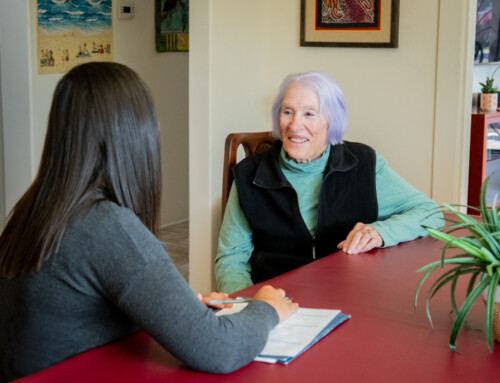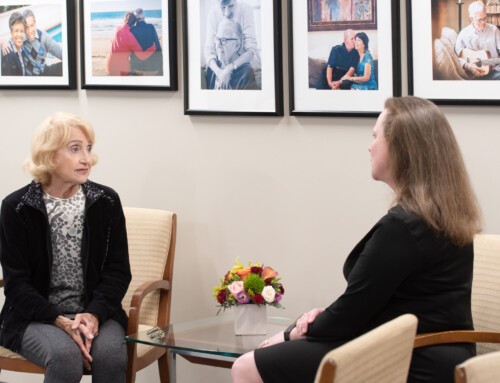Words matter – especially when it comes to dementia care. At Alzheimer’s San Diego, we strive to use terms, phrases, and words that don’t diminish but rather support the dignity of people living with memory loss. In honor of National Caregivers Day, we want to bring awareness to why certain terms may not be the best choice, and how simple substitutions can make a huge difference in how we view people living with dementia.
“Care partner” vs. “Caregiver”: Why make a distinction? As put by dementia care expert Teepa Snow: “Simply said, because a caregiver gives care, while a care partner partners in care.”
Being a “caregiver” can sound like a 24/7 solo responsibility where a person is pouring all of their energy into helping another, and possibly neglecting themselves in the process. “Care partner” on the other hand conveys this idea of working together, even with multiple people if needed, to find solutions that best enhance the person with dementia’s quality of life.
“The person you care for (or about)” vs. “your loved one”: We say someone with memory loss is “the person that you care for (or about)” rather than “your loved one” in recognition of the range of relationships that exist between people living with dementia and those who support them.
“Support systems” vs. “family”: We avoid focusing on “family,” opting to instead use the term “support systems” to be inclusive to those who may not have a family. This also puts the emphasis on people thinking about how their neighborhoods, social groups, and others in the community are (or can be) part of their support system. It serves as a reminder that you are not alone on this journey, too! The Alzheimer’s San Diego Clinical Care team and support groups can be a valuable part of your support system.
LEARN MORE | Join a support group today!
“Strategies for risk reduction and helping to maintain a healthy brain” vs. “prevention”: We don’t use the term “prevention,” but rather strategies for “risk reduction” for people who don’t have symptoms, and helping to “maintain a healthy brain” for people who already do have symptoms. We aim to support people who are living with dementia in keeping their brains and bodies as healthy as possible despite the presence of disease.
“Brain changes” vs. “challenging behaviors”: We don’t use phrases like “challenging behaviors” because it frames dementia symptoms as a choice, as if the person is choosing to be difficult. Instead, we use the broader phrase “brain changes” to more accurately reflect the physiological impact of the disease. Parts of the brain are damaged and dying, and this can result in major personality and behavior changes. But it is important to remember these are symptoms that are outside of the person’s control.
“Person living with dementia” vs. “Alzheimer’s patients suffering from the disease”:
We never refer to people as “suffering” or “victimized” by Alzheimer’s disease or dementia. When we hear people use words like “lost” or “gone” to refer to their person, we try to gently suggest reframing. There is a strong misconception that once a person receives a diagnosis that is an ending of identity and self. While a lot certainly changes and some memories might be “gone”, these comments diminish a person’s dignity and self-worth. It makes them seem as if they are no more than their disease when they should still be viewed and treated as people. This simple shift helps us to see how changes in behavior and personality are a result of brain abnormalities, separate from the person that’s still there.
To learn more about dementia care and brain health, talk to one of our Clinical Care Coaches today by calling 858.492.4400.





